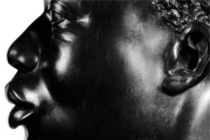Exhibition: Network of Mutuality: 50 Years Post-Birmingham

Exhibition: Network of Mutuality: 50 Years Post-Birmingham
Please join us on Wednesday, January 30, 2013 to celebrate the opening of Network of Mutuality: 50 Years Post-Birmingham. The opening reception will take place at The Art Gallery, 2202 Art-Sociology Building, from 6:00-8:00pm.
In conjunction with the exhibition's opening reception, there will also be a special lecture by Karina Aguilera Skvirsky, one of the participating artists in the exhibition. The lecture will take place in 2309 Art-Sociology Building, from 5:00-6:00pm.
The Art Gallery at the University of Maryland presents Network of Mutuality: 50 Years Post-Birmingham, an exhibition featuring provocative works by leading contemporary artists and graphic designers--Julie Moos, Glenn Ligon, Michael Platt, Ken Gonzales-Day, Archie Boston, Jefferson Pinder, among others--who carefully examine the various social conditions and components that energized the civil rights movement of the 1960s, as well as continue the dialogue of race and equality in today's society.
The United States was at a pivotal juncture in 1963. It was then that Dr. Martin Luther King, Jr. faithfully led a coalition of Civil Rights organizations in a peaceful and non-violent campaign targeting Birmingham, Alabama, a place then described as the "most segregated city in America." After being jailed for his participation in the protests, Dr. King penned a response to eight clergymen who were critical of his involvement. That response came to be known as Letter from Birmingham Jail, 16 April 1963, where he outlined that direct participatory action was a moral imperative in order to overcome injustice.
In that letter, Dr. King wrote: "I am cognizant of the interrelatedness of all communities and states. I cannot sit idly by in Atlanta and not be concerned about what happens in Birmingham. Injustice anywhere is a threat to justice everywhere. We are caught in an inescapable network of mutuality, tied in a single garment of destiny. Whatever affects one directly, affects all indirectly." Almost fifty years later, issues ranging from racial profiling to stereotyping, bleed through despite living in a "post-racial" era. And, yet, there still tends to be a continued collective resistance to discuss such issues more openly.
Network of Mutuality: 50 Years Post-Birmingham brings together works that address the injustices of 1963 and contrast today's contentious-yet-critical issues of race, representation, and otherness. The exhibition is curated by Audra Buck-Coleman and Ruth Lozner.
PLAN YOUR VISIT
Address
The Art Gallery
2202 Art-Sociology Building
College Park, MD 20742
Phone: 301.405.2763
Email: theartgallery@umd.edu
Hours
Tuesday through Friday: 11:00am to 4pm
Saturday: 1:00pm to 4:00pm
Closed Sunday & Monday
Admission
Admission to The Art Gallery is free of charge.
Please visit click here for more information.

